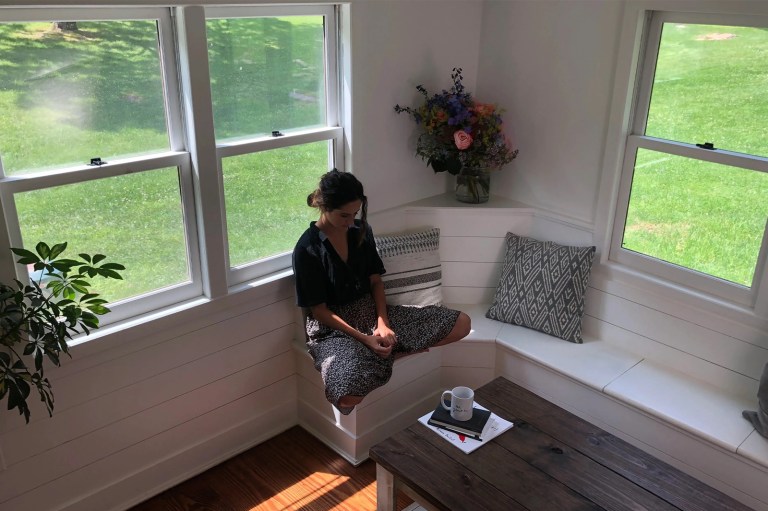
When You Feel Like You’re Playing Multiple Versions Of Yourself, All The Time
I tried to figure out who my truest self was, by narrowing my entire self down to just a few basic characteristics and then trying to embody them in every situation, as if it was some kind of math problem I had just been doing wrong all along. Instead, I noticed that by doing this,…
By ![]() Kim Quindlen
Kim Quindlen

For a long time, I felt like I was being fake around people. I wasn’t putting on a show. I wasn’t pretending to be someone I was not. I wasn’t lying about who I was or saying things that I didn’t believe.
But the thing that was so baffling to me was that every time I was with a different person or group of people, it felt like I was a different person. I always felt like there were seventeen different versions of me. I didn’t understand why, and I resented it often, because I felt like some kind of hypocrite or poser if I was silly with one person and then more serious around someone else. It took me a long time to comprehend the fact that I wasn’t being fake, I was just being me, in seventeen or forty-five or a hundred different ways.
A lot of us feel that way – that we’re constantly changing and adapting, not just to the situation we’re in, but we’re changing and adapting our own personalities. It feels like we’re all walking around with some kind of iguana personality syndrome, where we’re instantly and automatically changing colors depending on where we are and who we’re surrounded by.
For a long time, I tried to fight against it, fix it, fix me. I tried to figure out who my truest self was, by narrowing my entire self down to just a few basic characteristics and then trying to embody them in every situation, as if it was some kind of math problem I had just been doing wrong all along. Instead, I noticed that by doing this, I felt even more affected and unnatural than before.
It’s tempting to try to narrow yourself down into a few simple words or sentences. Maybe you’re funny and lighthearted and easygoing. Maybe you’re deep and contemplative and shy. Maybe your sensitive and empathetic and sophisticated. Maybe you’re quiet and withdrawn, but witty at the same time. It sounds simple enough, but what happens when you’re around a certain person or group of people that bring out other traits within you? What happens when you’re in a situation that causes you to react differently than you normally would? Are you fake? Affected? Insincere?
One of the first times that I was really forced to think about this question was when I started becoming close with an improv group I currently practice with in Chicago. It’s one of the main things I look forward to all week. We spend three hours together every Tuesday, putting ourselves out there and letting our insecurities shine through, while simultaneously tapping into our most innocent and emotionally open five-year-old selves who love nothing more than to make each other laugh. In the few minutes before class you can sense the excitement and energy in the room. We’re like a bunch of giddy kids on Christmas, ready to giggle and be surprised and laugh so hard that we have to hold our stomachs and pray that we don’t fart.
As you can imagine, this is a very loud, friendly, boisterous, funny group of people. We started going out every week after practice for drinks, and I was very overwhelmed in the beginning. Because every one of these people was the funny, silly person of their friend group, just like I was. I did not slowly seep into that clearcut “outgoing, silly person” role, because there were about fourteen other people who were used to doing the same thing. So I was shy around them in the beginning. Sometimes I’m still quiet. I like to sit around and watch them all continue to perform – long after practice is over – and allow my mind to be overstimulated by the amount of joy and hilarity that’s filling our surroundings.
For a period of time it made me feel weird. I felt stressed out or anxious if I wasn’t at the head of the table, cracking jokes and making people laugh and showing them instantly, in that moment, exactly who I was. But now, I can appreciate it for what it is – the experience that helped me to understand that I’m not a character in a three-page short story that you can sum up in a sentence. Just like every other person out there, I have a lot of different sections, a lot of different tendencies, a lot of different versions of me.
I can be the loud, funny one in front of my college friends and my family. I can still be silly and funny with my improv friends, but also allow myself to just sit back and be a sort of voyeur who can appreciate what’s happening around me. I can be vulnerable and open and calm with my boyfriend. I can be curious and earnest with the people I work with. The list goes on and, better yet, specific characteristics are not limited to specific people or situations.
Just because you’re usually the sensitive, empathetic one with your little sister doesn’t mean you can’t also be sensitive and empathetic with the coworkers who usually expect you to be upbeat and tough and ambitious. The various versions of you combined with the various people you know and situations you’re in is infinite. And it doesn’t mean you’re acting affected or insincere.
You’re just a multifaceted person with a lot of layers and a lot of experiences and a lot of feelings that make you behave differently in different circumstances. Sometimes we’re all putting on a show, sure, that’s natural. We all have certain teachers or bosses or job interviewers or parents-of-boy/girlfriends that we want to impress. But for the most part, we’re all just a lot of different genuine versions of ourselves at a lot of different times, being as real as we can possibly be in that moment, no matter what that means. The best part is, discovering our truest selves is a never-ending game, because we’re allowed to be as many different “truest selves” as we want. ![]()











